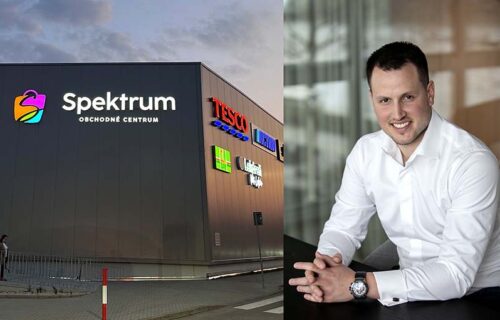Mayflower property development and investment continues to strengthen its position as one of the country’s most active regional retail park developers, with several new schemes completed this year and a growing pipeline ahead. In a recent Q&A with CIJ EUROPE, Partner Lukáš Šarközi said the company remains focused on meeting tenant demand, expanding in underserved areas, and preparing for a broader evolution in its development strategy.
“We delivered projects in Lučenec and Nové Zámky this year, and we will soon open the second phase in Rimavská Sobota,” said Šarközi. “Together, that will bring more than 8,000 square metres of retail space to the market. Earlier in the year, we also completed a smaller scheme in Šamorín.”
According to Šarközi, Mayflower’s success stems from a steady appetite among tenants and new brands entering Slovakia. “We just meet the requirements of tenants that want to expand,” he explained. “In the last two or three years, several newcomers have entered the market, bringing around 6,000 square metres of new space. Because of these larger-format brands, today’s projects tend to be slightly bigger.”
Šarközi said the company has a strong development pipeline planned for the coming years. “In three years, we expect to deliver about 100,000 square metres of GLA to the market,” he noted. “Within the next two years alone, we will complete around 65,000 square metres. We see a lot of potential in mid-sized cities where retail infrastructure is still limited.” He added that securing strong locations early gives developers a decisive advantage: “If you have a city of 30,000 people and you deliver a retail park of 8,000 or 10,000 square metres, you can effectively anchor the market and make it difficult for future competitors.”
Mayflower’s approach to financing has evolved as the company has grown. “We had a very good relationship with 365.invest and developed many projects together,” Šarközi said. “Now, part of the portfolio we sold to them, and part we bought back. It’s a natural life cycle of our cooperation.” Today, the company operates with a more independent structure. “Some projects we do entirely on our own, and others with senior bank financing. For future developments, we are not seeking new institutional partners. We are focusing on self-financing and maintaining flexibility with a mix of equity and bank loans.”
As the Slovak retail market matures, Mayflower is also exploring diversification. “Retail has been our foundation because we understand it well — retail is detail,” Šarközi said. “But the market is changing. We are evaluating some logistics projects, although that segment is currently slower, as is office development.” He pointed to the country’s new rental housing legislation as a promising area for future activity. “We see this as a big opportunity in the regions. We already have strong relationships with municipalities, and they face real challenges in providing accessible, quality housing. We believe rental housing supported by both government and private initiatives could be an important solution.”
Sustainability has become a core element of Mayflower’s development strategy. “This is a very important topic for modern development,” said Šarközi. “We are installing photovoltaic systems to generate energy from the sun and using VRV systems to improve energy efficiency. All our projects are developed in line with ESG standards during both construction and operation.” Community engagement is equally important to the company’s identity. “When we come to a city, we support local initiatives and sports clubs,” he said. “We often organise charity events during project openings and donate to local hockey and football teams. Giving back to the community is very important for us, especially when we can support young people through sports.”
Šarközi also recognises that changing consumer habits are reshaping the retail landscape. “Consumer spending is a little lower, and the shopping basket has changed,” he said. “People are focusing more on essentials rather than luxury or higher-end goods.” He added that new entrants are intensifying competition: “Several discounters like Woolworth and Biedronka have entered the market almost simultaneously, which means we now have more discount stores competing for the same customers. In the medium term, turnovers may decline because the wallet is not as big as the market.”
Despite this, Šarközi sees clear potential for further growth in Slovakia’s retail sector. “According to some statistics, Slovakia has one grocery store per 10,000 inhabitants, while in Poland it’s one per 5,000,” he said. “That shows we still have room to grow — but only in the right locations. We calculate each site carefully, sometimes twenty times over, to make sure the project will work long term.”
He concluded that Mayflower’s focus remains on quality, not quantity. “We have a strong pipeline of projects, but our goal isn’t just to build more — it’s to build better. We focus on large, well-anchored retail parks in cities where the retail offer is still underdeveloped. That’s how we can bring real value to both our tenants and the communities we serve.”
© 2025 cij.world
